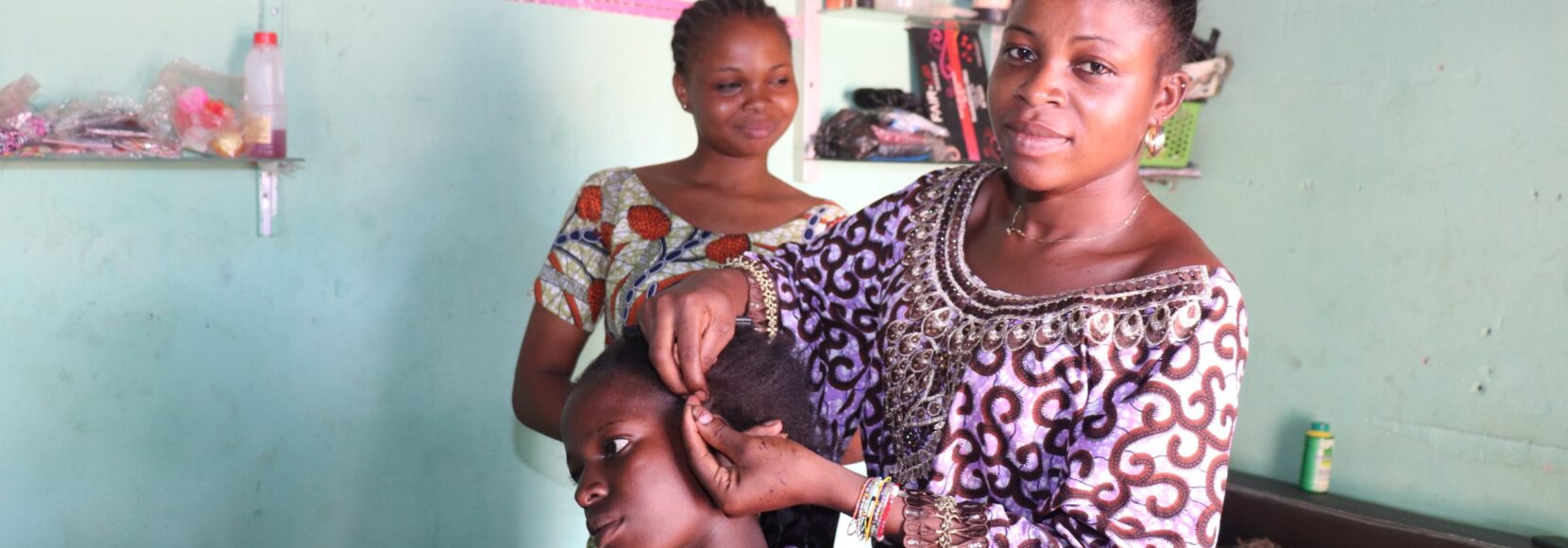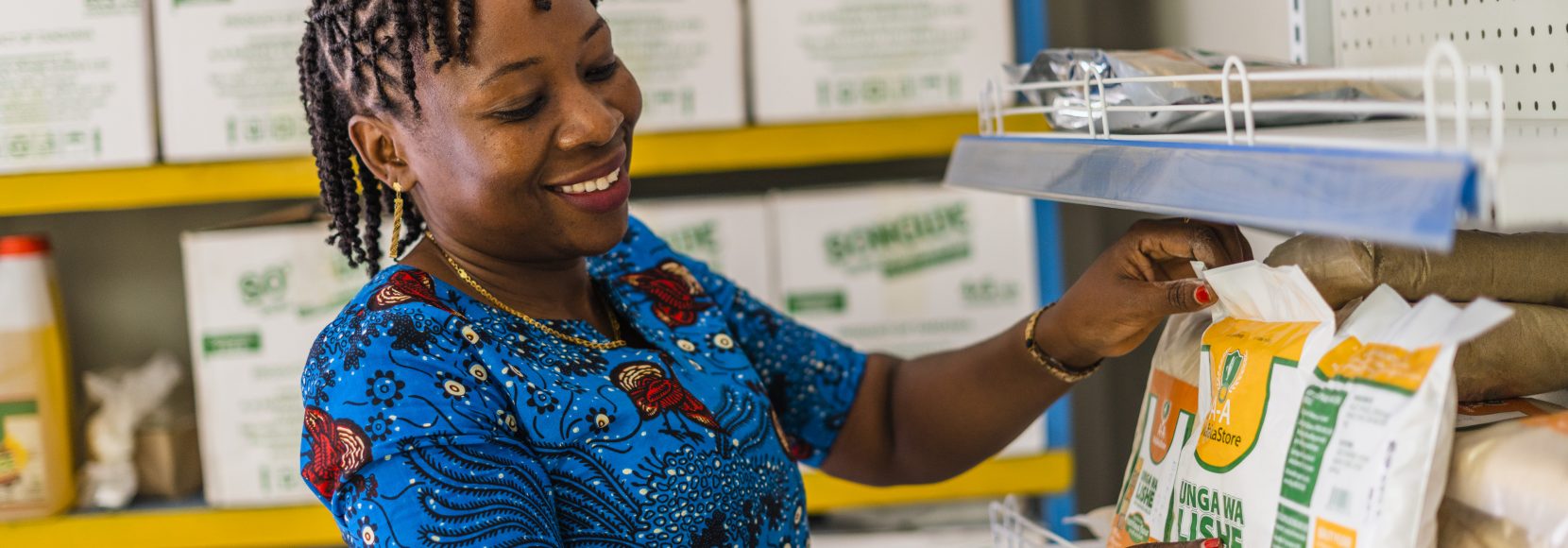
Ask a TechnoServe Expert: Evelin Rincan and Andrea Bettosini on Digitized Entrepreneurship
"Ask a TechnoServe Expert" is a series where our staff members, who work on a range of important global development issues, answer your questions. In this edition, Evelin Rincan, Entrepreneurship Practice Manager, and Andrea Bettosini, Global Entrepreneurship Manager, answered your questions.
With a background in research, consulting, and digitized entrepreneurship, Evelin Rincan has been supporting TechnoServe’s entrepreneurship programs for more than six years while stationed in the El Salvador office.
Andrea Bettosini is based in Chile and has 11 years experience working in global entrepreneurship programs at TechnoServe.
Did you find that COVID-19 impacted women entrepreneurs more than men? And if so, why, and in what ways?
– James K., Riyadh, Saudi Arabia
Andrea: TechnoServe has found that COVID-19 exacerbated existing inequalities between women and men entrepreneurs. The sectors that were most severely affected by lockdown have a higher concentration of women-owned businesses. Additionally, unequal distribution of household labor posed an extra burden for women entrepreneurs. Gender norms that position women as the main caretakers made women entrepreneurs face the extra challenge of adapting their businesses to the new reality while figuring out care for children and the sick as well as remote education, while in isolation.
In spite of that, being able to face the pandemic with the support of an entrepreneurship program has helped entrepreneurs make informed decisions before they encounter serious financial difficulties. In July 2020, a TechnoServe survey found that 67% of women-owned businesses we supported had reported that their sales had declined over the past month, but by December 2020, only 22% were facing sales decreases.
Women entrepreneurs faced particularly challenging [COVID-19] situations.
– Andrea Bettosini
For example, in El Salvador, the Citi Foundation and TechnoServe worked with Fátima Meléndez, the owner of Lafá Cake Boutique. The bakery specialized in providing cakes and other pastries for weddings; when public events were banned during the country’s lockdown, the business was at risk of failing. With support from the entrepreneurship program, Fátima reinvented her business to instead provide less elaborate cakes for home consumption, and her sales boomed to their highest levels ever as customers sought to treat themselves during the crisis.
Evelin: Yes, COVID-19 increased the obstacles that women entrepreneurs, in particular, face in developing countries. Women around the world had to cope with increased domestic work and homeschooling, which meant that they had even less time than before to spend on their businesses – not to mention business skills training.
As Andrea mentioned, entrepreneurship programs helped business owners to rapidly adapt. Digitization was key in allowing us to provide our continued support to them. Thankfully, when COVID-19 hit, we had been working on digitizing our services for some time, so we didn’t have to interrupt our operations.
Because we provided training content online, women participating in our programs could access our trainings whenever they were less busy. For example, in Kenya, micro-retailers reported accessing our online courses late in the evening after closing their businesses and completing their household chores.
Lastly, it’s also important to mention that COVID-19 made some of the root causes of gender inequalities more evident than ever. Now, we should ask ourselves: How fair is the role distribution in our own household? Hopefully, this will result in socio-cultural changes that will help diminish the inequalities among women and men in the future.
How does TechnoServe leverage partnerships in its entrepreneurship work?
– Cleopatra I., Mumbwa, Zambia
Andrea: No organization can tackle problems like job scarcity, climate change, or gender inequality alone…and these are only a few of the world’s most pressing problems that entrepreneurship can address. TechnoServe has a long history of working with both public and private partners that provide the funding to make projects possible.
But partnerships are essential to everything we do with entrepreneurs. Our programs frequently include market-level interventions such as linking entrepreneurs to existing financial services in specific communities and developing the entrepreneurial ecosystem through partnerships.
Evelin: What our partners have in common is that they share our vision on how businesses are a lasting solution to poverty and a means to improve the lives of those in vulnerable sectors. But from what Andrea mentioned, you’ll notice that there are different ways partners can support entrepreneurship programs beyond critical financial support. Let me give you some specific examples:
- In Latin America, TechnoServe is part of the Beyond Extraction public-private partnership with Anglo American and the International Development Bank. This partnership aims to leverage the expertise of each organization and harness mining activity to create local economic development.
- In Africa, where the Citi Foundation funds many micro-retail programs, Citi volunteers also engage directly with micro-retailers in the field by providing their advice and expertise.
- Other partners get directly involved in the creation and improvement of our training. Currently, we are collaborating with Caribou Digital in the development of an e-commerce digital toolkit. They bring a whole new perspective on digital training and push us to rethink our own paradigms around content design.
We also leverage the support of academic institutions and external evaluation firms to implement rigorous results measurements of our programs and to help us extract learnings that can then be shared with the global entrepreneurship development sector.
COVID-19 has illuminated disparities based on socioeconomic status. How do small businesses play an active role in combating inequality?
– Meera K., Washington, D.C.
Andrea: Small businesses are key employers worldwide, but especially in low-income societies. I’m proud that we help entrepreneurs use increased income to achieve their dreams – like paying school fees or expanding their house – but I’m even more excited when they say that they are proud employers.
Several years ago, we were evaluating the long-term impact of one of our programs. We asked a woman with a long history of managing a family restaurant about the most significant change after participating in our program. And she said that she felt she was a better employer.
Before the program, she used to shoulder the responsibility of being the main source of income for about 17 employees, most of them immigrants in highly vulnerable situations. She said that TechnoServe gave her the tools to understand the numbers of her business better and make smart investment decisions. She said that now she knows she can pay the salaries and that these families will have an income by the end of the month. That’s what she was most proud of. These stories make me proud to work in entrepreneurship as one of the many possible ways to tackle economic inequality.
Evelin: I think that it is also important to mention that those entrepreneurs who engage in business skills development programs tend to be more resilient. Participating in entrepreneurship programs means that they’re not ready to give up, they have hope, and that they’ll fight to adapt their business models to new circumstances. They might have a more positive outlook and expect that their businesses will bounce back. Resilient entrepreneurs tend to retain employees.
I was amazed by how quickly TechnoServe adapted services to build entrepreneurs’ resilience in the face of the COVID-19 pandemic. The entrepreneurship practice leveraged field teams’ past experience managing crises and rapidly developed a Business Survival Toolkit. I remember that Andrea conducted a webinar series to disseminate the toolkit among our offices around the world. I felt truly inspired by how many colleagues would join the sessions with a true desire to help entrepreneurs become more resilient in their countries and communities.
Sign up for emails to learn more about our entrepreneurship programs.





